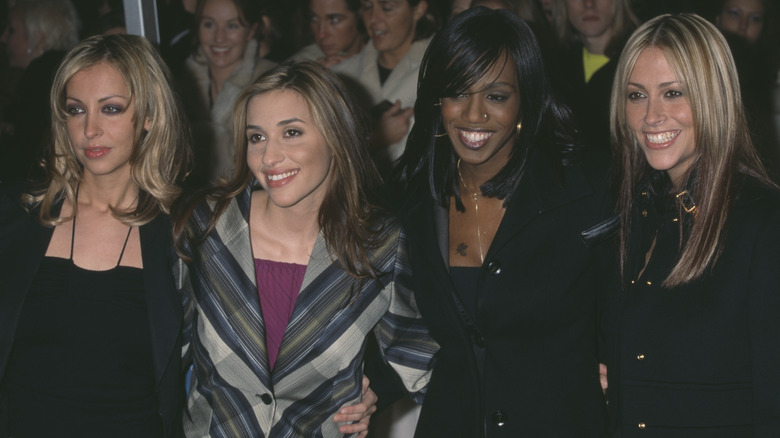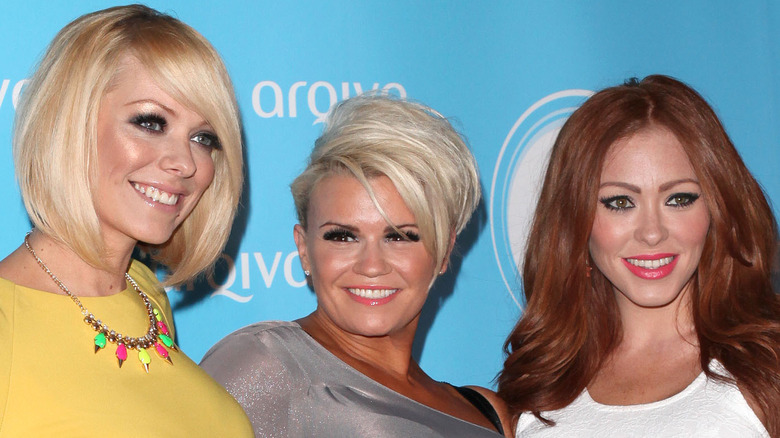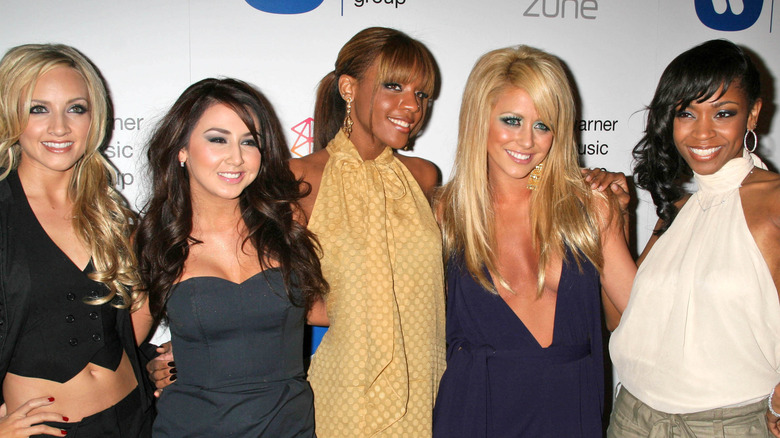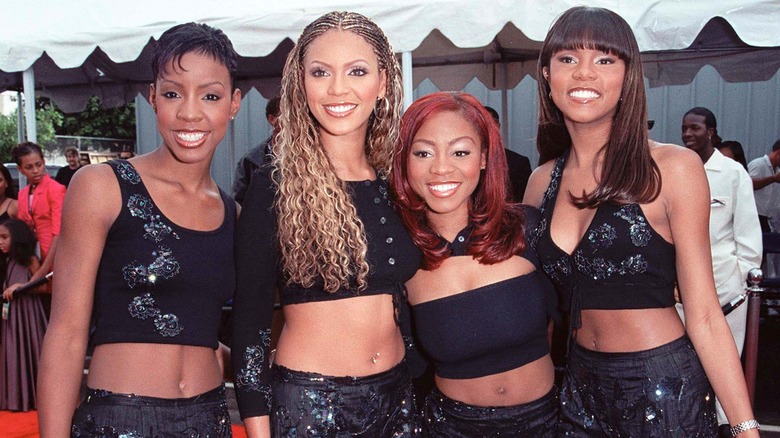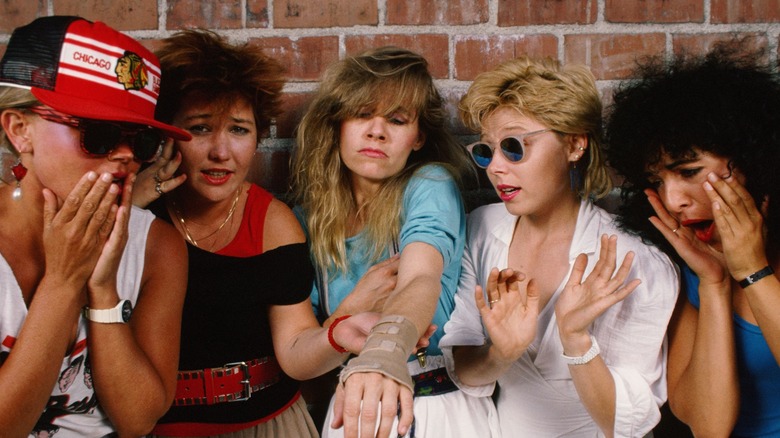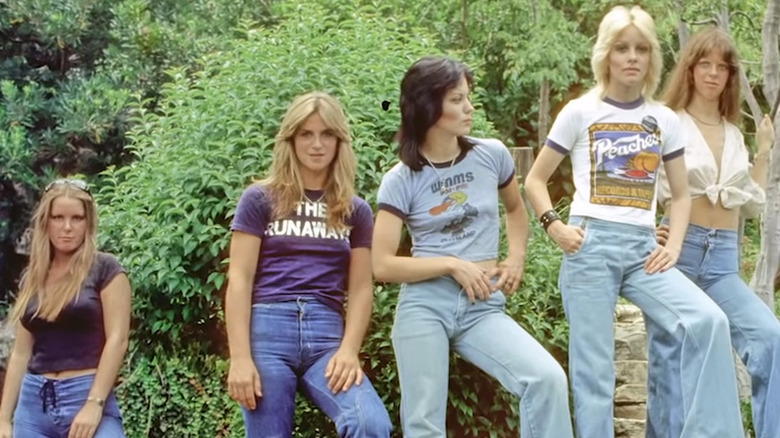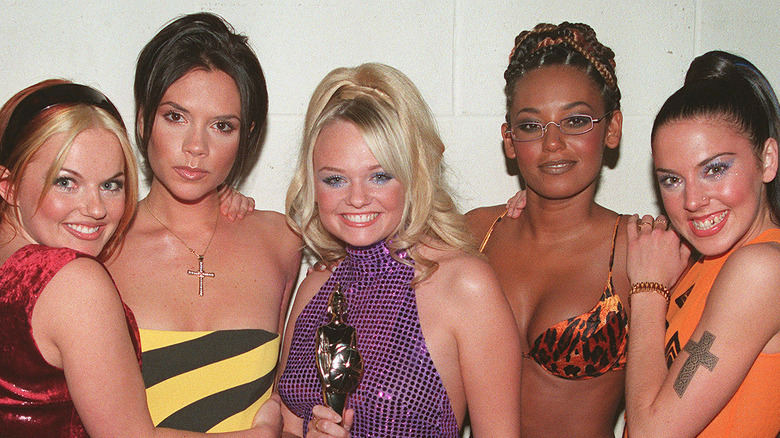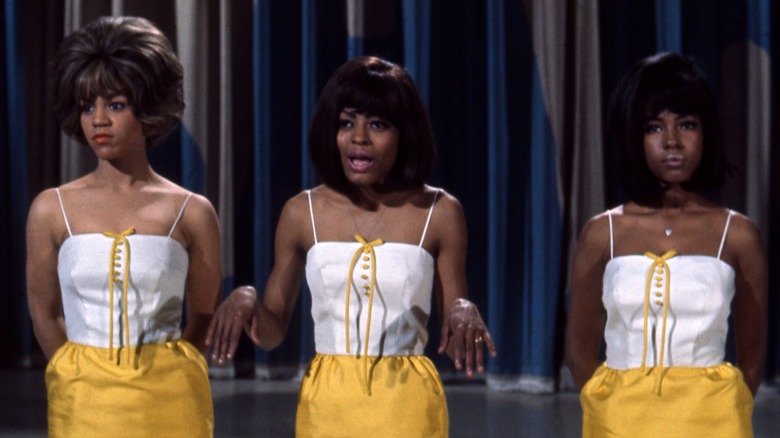Girl Group Members Who Couldn't Get Along
The following article includes allegations of sexual assault and mention of addiction.
What's most intriguing about girl groups, from Destiny's Child to Danity Kane, was the façade most of them maintained while conquering the charts. It helped to have shapely chanteuses in tight-fitting outfits with neatly coiffed hairdos and luminescent teeth to boost their popularity, a nifty formula that worked wonders on acts going as far back as The Andrews Sisters, regarded as the most popular female vocal troupe from the first half of the 20th century. But beneath those shiny surfaces lurked an infrastructure of managers and producers who often took advantage of these women, by manipulating their images, providing male-approved material to work with, and in extreme cases, even ripping them off.
To those singers, many of them young and naïve, that lack of career control might have been disheartening. But imagine the internal friction when one member received preferential treatment and an opportunity to go solo. That situation killed several girl groups, but not before pitting bandmates against each other. Making matters worse was how some acts relied on drugs and alcohol to cope with the pace of touring and recording, which handlers and labels managed to cover up until long after those groups disbanded. Fortunately, saner heads have prevailed in recent years and more empowered acts like The Spice Girls have managed to garner a bigger say in matters related to style and direction. But that hasn't quite resolved the ego factor, as scores of girl groups had more than their fair share of personality conflicts.
All Saints were hardly holy behind the scene
One act rivaling the pandemonium of million-selling quintet The Spice Girls in the '90s was Brit foursome All Saints, whose 1997 eponymous debut became the third best-selling release from a girl group of all time, per Daily Mail. But unlike the Spice Girls, prefabricated by a conglomerate seeking eye-candy artists, All Saints were already a unit that started independently in their teen years and lived hand-to-mouth until a label finally signed them. From that point on, the hits came fast and furious, especially "Never Ever," their best-selling single ever. And with that popularity came an adjustment to life under the spotlight, an industrial ecosystem for which they were ill-prepared. Overwhelmed by pressure, the feisty energy All Saints deployed to distance themselves from the more demure Spice Girls was instead triggered internally, creating a toxicity that the media dubbed "Brawl Saints" and kiboshed the group in 2001.
Per The Sun, battle lines were apparently drawn with sisters Natalie and Nicole Appleton squaring off against fellow singers Melanie Blatt and Shaznay Lewis. Since reunited, and during a 2016 appearance on the U.K. talk show "Alan Carr: Chatty Man," the quartet apparently came clean about the breakup. Nicole Appleton said fights occurred whenever the whole band was experiencing hangovers. "We are very honest with each other, that's the thing," she added. "But we didn't take the honesty very well back then," chimed in Lewis. "That's what it was. And understandably so, we were so young."
Atomic Kitten fought each other regularly
Armed with a suitable moniker, Atomic Kitten exploded onto the scene in the late '90s with European Top 10 hits like "Right Now" and "See Ya." But for every single that hit the charts, tabloids worked overtime documenting other impactful moments inside the Atomic Kitten camp. Singer Kerry Katona dished on one instance when she was punched from behind by colleague Liz McLarnon before a show. "I made her get changed in the toilets at SMTV Live," she recalled in her column in New Magazine (via The Mirror). "Then I stamped on her feet while we were up on stage singing 'Whole Again.'" Katona, who quit the band in 2001 to raise a child, wasn't exactly enamored by fellow vocalist Natasha Hamilton, who lamented Katona stabbed her in the back, per Digital Spy. Jenny Frost replaced Katona and stayed with the band until it split in 2005.
When scuttlebutt over a 2013 reunion surfaced, Katona wanted in, despite Frost declaring to Closer, "I'd rather eat my own kidney with a spoon" (via Cosmopolitan) than let the former singer back into the fold. Instead, the group chose Katona over Frost, but it wasn't long before she was back in the rest of the band's bad books again. In 2018 ,she announced plans to perform in India without informing her bandmates. Shortly after that, with more bad blood spilling between them, Katona left for a second time. In 2021, Metro reported Frost had rejoined the group.
Danity Kane was a tempestuous hotbed
If there was a space in the girl group saga waiting for mayhem to happen, Danity Kane would have occupied Ground Zero. The outfit had all the right ingredients for drama to hit audiences right between the ears, from its 2005 inception as part of the MTV reality series "Making the Band" to its helming by rapper Sean "Diddy" Combs, himself no stranger to controversy. Singer Aubrey O'Day blamed much of the toxicity on Combs, whom she claimed was intense and sexist toward the group. "We were scared to death with what would happen with Puff each day," she said to Variety. After three years, Combs reportedly found O'Day's arrogance too much to handle and sacked her and fellow vocalist D. Woods, with the rest of the group dissolving in 2009. "I just want to work with the young lady that I signed," said Combs (via Us Weekly). "Not the person that fame has made her."
Even without Combs, still unresolved was the bad blood between bandmates. A 2013 reunion ended a year later with an in-studio catfight between O'Day and vocalist Dawn Richard over vocal mixing issues. "When something is poison and you go into the studio and people are literally going behind your back and lying to you ... that's foul," said Richard on radio show "The Breakfast Club." They tried another reunion in 2018, this time as a trio that included O'Day, Richard, and Shannon Bex, who eventually dropped out to go solo. As a duo, Danity Kane disbanded in 2020 without any drama.
Destiny's Child was divided from the start
Destiny's Child had a legacy of impressive hits, selling 60 million albums and singles worldwide, while collecting two Grammy awards. But during the group's ascent in the '90s, the optics indicated that vocalists Beyoncé Knowles and close friend Kelly Rowland received preferential treatment over the others. For openers, Knowles' dad managed the group and favored his daughter and Rowland, a situation that didn't sit well with remaining members LaTavia Roberson and LeToya Luckett. Inexplicably, the latter singers discovered they were replaced by Michelle Williams and Farrah Franklin after seeing their successors perform on a video for their 1999 hit "Say My Name." Roberson anticipated a meeting to settle their differences. "Before we knew it, we were looking at the 'Say My Name's' video on TV," she said on Kempire Radio. "That meeting never happened."
Franklin, stressed over the group dynamics and favoritism, suddenly quit after five months during a promotion blitz in Seattle. "When I went into the room for us to have a group conversation, it was like everybody started ganging up on me," she said on VladTV. For her part, Williams claimed she had no issues with Knowles and Rowland. "The media wanted to write its own narrative of jealousy and spats and drama, but none of that was true," she said in The Sydney Morning Herald. But after a 2003 break to work on solo projects, which were so successful that they no longer needed each other, Destiny's Child disbanded in 2005.
Fifth Harmony played second fiddle to Camila Cabello
Cobbled together in 2012 on the U.S. version of "The X-Factor" by media mogul Simon Cowell, Fifth Harmony became a set of familiar faces thanks to their Top 10 hit "Work From Home." The girl group also served as a talent incubator for ingénue Camila Cabello, who stood out from the rest, according to show adjudicator Demi Lovato. Disappointed at Fifth Harmony's flaccid performance in one episode, Lovato said, "Right now, there's only one person doing it for me." That didn't sit well with her mates, especially Normani Kordei, the only Black singer in the group and the sole member who never sang lead. During a Galore interview, Kordei had superlative things to say about colleagues Ally Brooke, Dinah Jane, and Lauren Jauregui, but hesitated when it came to Cabello, calling her "very quirky, umm, cute." The response led to Cabello fans cyberbullying Kordei, sometimes with racist posts, to the point where she had to temporarily leave Twitter. "It was really ugly," Kordei said to Teen Vogue.
Cabello evidently created some ill-feelings among the rest of Fifth Harmony when she decided to go solo in 2016. A group statement on Instagram mentioned her departure in passing, adding "We wish her well." The rest of the message focused on how the group was setting its sights on the future: "We are four, strong committed women who will continue with Fifth Harmony as well as our solo endeavors."
The Go-Go's conflicts stemmed from burnout
Before Girl Power and the alt-rock Riot Grrlz movement, the Go-Go's set the bar for girl groups everywhere. They were the first female act that played their own instruments and wrote their own songs to grab a Billboard top berth. They dominated radio and MTV with hits like "We Got the Beat," "Our Lips Are Sealed," and "Vacation." And it all seemed to happen in a flash. "In the course of a year, we had gone from playing dive bars to Madison Square Garden," recalled guitarist Jane Wiedlin in the group's eponymous Showtime documentary that aired in 2020.
The stress of such breakout fame resulted in singer Belinda Carlisle developing an eating disorder and dependence on alcohol and cocaine, while guitarist Charlotte Caffey wound up with a heroin addiction. That meteoric rise in 1981 eventually gave way to the group falling back to Earth in 1985, victims of the fast-paced life of recording, touring, and promoting their wares. By then, guitarist Jane Wiedlin had left the group, already divided with Carlisle and Caffey on one side, and drummer Gina Schock and guitarist Kathy Valentine on the other. In 1985, Carlisle and Caffey announced The Go-Go's had broken up, but left management to deliver the news to the remaining original members. "It wasn't really done in a way that's proper after working with someone for all these years," said Schock to LA Weekly. "But it's fine with me."
If you or anyone you know needs help with addiction issues, help is available. Visit the Substance Abuse and Mental Health Services Administration website or contact SAMHSA's National Helpline at 1-800-662-HELP (4357).
The Pussycat Dolls had a diva threatened by a newbie
It goes without saying that one prerequisite for a successful girl group is the eye-candy element, namely photogenic women (sometimes bearing a sheen not unlike a hardwood floor finish) in skimpy costumes to accentuate the undulations onstage. Which is why it seemed to make perfect sense to morph a Los Angeles burlesque dance troupe into a singing outfit called The Pussycat Dolls. It worked. From 2005 to 2010, the act churned out dance hits from "Don't Cha" to "Stickwitu," and even became regulars on the U.K. version of "The X-Factor."
One member who particularly enjoyed the attention was Nicole Scherzinger, who was given most of the leads and dominated center stage, to the detriment of the remaining lineup. Lamented fellow vocalist Kaya Jones to TMZ, "Nicole was always someone who wanted to be in the spotlight and would do pretty much anything to get it." She was reportedly especially hostile to relative newcomer Melody Thornton, a member with vocal training who was always relegated to the background. "I lost so much confidence and felt really worthless," said Thornton to The Mirror. But at the 2006 American Music Awards, Thornton upstaged Scherzinger with a show-stopping vocal ad-lib that left the diva unimpressed.
The Runaways were manipulated from the start
As teens barely able to play their instruments when they were first assembled by eccentric manager Kim Fowley, L.A.'s The Runaways found themselves stuck with a trashy jailbait image during the '70s. Retrospection, however, has been much kinder, with pundits pointing out their impact on future femme outfits from L7 to Courtney Love's group Hole. Despite having a sex-crazed megalomaniac who handled their careers, The Runaways held their own, yielding four albums and a cult hit in "Cherry Bomb."
Throughout the tough grind the band endured, the girls wound up hating each other, often via Fowley's manipulation. According to Autostraddle, singer Cherie Currie and guitarist Lita Ford were often at each other's throats, as the band almost literally starved on the road and coped with touring by constantly consuming drugs and alcohol. But the most horrifying account came from bass player Jackie Fox who told Huffington Post in 2015 that Fowley (who had since died of bladder cancer) raped her during a tour, while singer Currie and guitarist Joan Jett looked on. "I didn't know if anybody would have backed me," said Fox about why she stayed silent about the incident.
The loathing continued long after The Runaways broke up in 1979. Ford, who pushed for a reunion tour in 2018, took shots at Jett, who has since enjoyed a lucrative career, for holding out on the opportunity. "Joan Jett is very much in Joan Jett Land," Ford said to the Daily Mail.
If you or anyone you know has been a victim of sexual assault, help is available. Visit the Rape, Abuse & Incest National Network website or contact RAINN's National Helpline at 1-800-656-HOPE (4673).
The Spice Girls had fisticuffs
The most popular all-female group of all time, The Spice Girls milked their Girl Power slogan all the way to the bank, selling more than 80 million records worldwide and yielding hits like "Wannabe" and "Viva Forever." Throughout the '90s, Victoria Beckham (Posh), Melanie Brown (Scary), Emma Bunton (Baby), Melanie Chisholm (Sporty), and Geri Halliwell (Ginger) were everywhere and mercilessly unavoidable. But the superstar quintet wasn't immune to letting all that femme-infused glory go to their heads, causing them to sometimes turn on each other.
According to The Mirror, one colorful altercation took place between Brown and Chisholm. "We were too drunk," recalled Brown about one incident early in the group. "We got a bit pushy, shovey, and Geri stepped in the middle to break it up and ended up getting punched in the face." Brown also started a row with Halliwell when she publicly told journalist Piers Morgan that the two had been intimate. But the most frequent fighters seemed to be Beckham and Brown, including the time the latter went ballistic when Posh refused to lend her one of her designer dresses.
In 2018, the Daily Mail reported Beckham became the object of scorn among the rest of the band when she backed out of a reunion tour, even though she previously announced she was on board. With each performer slated to earn $8.8 million from the junket, apparently Beckham was the only one who didn't need the cash.
The Supremes had to deal with Diana Ross
During the '60s, Motown Records ruled the girl group roost, as it was home to acts like The Marvelettes, Martha and the Vandellas, and The Supremes, a Detroit trio that not only dominated the decade but created the template for other acts to follow generations later. Starting in the '50s as The Primettes, the group juggled personnel changes until it was comprised of Florence Ballard, Mary Wilson, and Diana Ross. Motown boss Berry Gordy took the group under his wing, changed their name, and turned them into stars via a string of hits like "Where Did Our Love Go" and "Stop in the Name of Love."
Of the three, Ross received the largest share of the spotlight, which didn't enthrall the rest of the troupe. In particular, Wilson noticed a rift in the making when Ross wanted to wear a different outfit from the other two, and on TV, to stand as far away from them as possible. "She craved attention, and in her attempts to get it, she could seem almost ruthless," Wilson recalled in her memoir, "Dreamgirl: My Life as a Supreme." Ross also had a romantic relationship with Gordy, who encouraged her to go solo, which she did in 1970. She also walked away from her feud with Wilson, who in her last interview before dying in 2021, regretted not making peace with Ross. "I do not have a lot of regrets," Wilson said to The Sun. "I have done lots of things and made mistakes."


